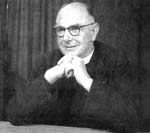CHURCH MISSIONARY SOCIETY ARCHIVE
Section III: Central Records
Part 21: Diaries of Dr Max Warren (General Secretary of CMS, 1942-1963) and Family
Max Warren was born in Ireland in 1904 while his parents were on leave from their missionary work in India. After obtaining a degree in history and theology at Cambridge University he trained for the Anglican ministry at Ridley Hall, Cambridge. He went to Northern Nigeria as a member of the Hausa Band which was committed to evangelizing Muslims but was invalided home less than a year later. He was ordained in 1932 and from 1936-1942 served as vicar of Holy Trinity Church in Cambridge.
In 1942 he was appointed General Secretary of CMS. Rosemary Keen, ex archivist of CMS says: “Warren proved to be a man of vision for the twentieth century as Venn had been for the nineteenth. He set about immediately to formulate and prepare the Society for its role in a post-war, post-Empire Britain….”
He traveled widely all over the world for the society for over twenty years. During this time he visited all the CMS missions, attended international mission conferences and was invited to give lectures during his visits to USA, Asia, Africa, Europe and Australasia. He was active in interpreting the relationship of mission to the Church overseas and at home, between cultures and between Church and government. He also acted as international advisor to Archbishop Geoffrey Fisher and as counselor to key people in public life.
In addition he educated the Christian public through the CMS News-letter which had a worldwide circulation of around 14,000. In the pamphlet literature he discussed key theological issues of the day and interpreted current missiological books. He wrote extensively on theology and mission work and gave a series of lectures on the missionary movement at the Faculty of Divinity, University of Cambridge.
His diaries cover the following areas and years:
- Visit to USA and Canada for the Jubilee of Foreign Missions Conference of North America and for the Convocation of Wycliffe College, Toronto, 1943-1944
- Round the World, 1947
- “Forty Thousand Miles” – a visit to Australia, Egypt, Tanganyika, Kenya, Uganda, Sudan, 1949-1950
- Germany – The Willingen Conference, 5-17 July 1952
- USA, 1954-155 including conferences at Meadville and Evanston
- East Africa: Tanganyika and Kenya, 1955
- Germany: Conference on the Church’s task in areas of social change, 17-20 July 1956
- West Africa, 1957-1958
- USA and Canada, 1958
- Japan to receive an honorary degree from Rikkyo University,
23 October-13 November, 1959
- USA and New Zealand for a conference at Kanuga, USA and a meeting of the Federal Council of CMS of Australia, 1960; Malaya and India, Pakistan, Iran, Lebanon, Jordan and Israel, 1960-1961
- South America, 1962
- Iran and Greece, 1962
- Denmark, Norway, Sweden and Finland, 1963
- Canada for conference of Missionary Executives, 1963
- West Africa, 1964
- USA and Canada, 1964-1965
- South Africa, Kenya and Uganda, 1965
- Israel – report on a conference on Ecumenical principles, 1967
- India, 1967
- Holland to give lectures at Free University, Amsterdam, 1969
- Israel to attend a colloquium at Hebrew University, Jerusalem, 1970
- Uganda, 1970
The diaries are written in a very informal chatty tone and give the researcher a feel for the man himself as well as giving great detail on his visits. Together with descriptions of his meetings and talks with clergy and bishops, conferences and lectures, visits to universities, schools and hospitals, he includes his views on the politics and the future and present state of Christianity of the countries he visited. There is also vivid detail on the towns, sights and scenery visited. With a rise in nationalism he anticipated decolonization and frequently recommends the need for more responsibility to be given to the local people themselves.
Some of the diaries contain interesting additional items such as telegrams, photographs, conference programmes, news cuttings and postcards.
A wide ranging number of topics are covered including:
-
Colonialism
-
Theology
-
American politics and the future of America
-
The state of the Anglican church on the East coast of USA
-
America’s views of Great Britain
-
The Church in Canada
-
First impressions of China, including a description of the food, customs with details on visits to embassies, government departments
-
Chinese politics and the state of the Christian Church in China
-
Aborigines in the Australian settlements describing their customs
-
Leprosy among the Aborigines
-
The Australian Church
-
Muslim life in Egypt
-
Women missionaries in Egypt and their work
-
Medical work in Egypt
-
The Revival Movement in East Africa
-
Social and economic change in Africa
-
Meetings with African Kings and chiefs
-
Need for more girls’ education in Africa
-
Tension between Older and Younger Churches
-
Internationalisation of missionary work
-
Church Union
-
The Jewish question and Israel
-
Nationalism
-
Communism
-
The role of women
-
Ethnic tensions
-
Polygamy
-
Atomic Bomb Casualty Commission, Hiroshima
-
Politics in the Congo
-
The Church in Cuba
-
America’s views of underdeveloped countries
-
Spread of Pentecostalism and Mormonism in Australia
The Max Warren diaries are an important source for the study of religion, politics and cultures in the second half of the 20th century.
|

|















